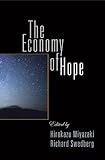The Economy of Hope / ed. by Hirokazu Miyazaki, Richard Swedberg.
Material type: TextPublisher: Philadelphia : University of Pennsylvania Press, [2017]Copyright date: ©2016Description: 1 online resource (208 p.) : 5 illusContent type:
TextPublisher: Philadelphia : University of Pennsylvania Press, [2017]Copyright date: ©2016Description: 1 online resource (208 p.) : 5 illusContent type: - 9780812293500
- 302/.1 23
- online - DeGruyter
| Item type | Current library | Call number | URL | Status | Notes | Barcode | |
|---|---|---|---|---|---|---|---|
 eBook
eBook
|
Biblioteca "Angelicum" Pont. Univ. S.Tommaso d'Aquino Nuvola online | online - DeGruyter (Browse shelf(Opens below)) | Online access | Not for loan (Accesso limitato) | Accesso per gli utenti autorizzati / Access for authorized users | (dgr)9780812293500 |
Browsing Biblioteca "Angelicum" Pont. Univ. S.Tommaso d'Aquino shelves, Shelving location: Nuvola online Close shelf browser (Hides shelf browser)

|

|

|

|

|

|

|
||
| online - DeGruyter Counter Jihad : America's Military Experience in Afghanistan, Iraq, and Syria / | online - DeGruyter Antigay Bias in Role-Model Occupations / | online - DeGruyter Human Rights or Global Capitalism : The Limits of Privatization / | online - DeGruyter The Economy of Hope / | online - DeGruyter Faces of Moderation : The Art of Balance in an Age of Extremes / | online - DeGruyter The Integrated Self : Augustine, the Bible, and Ancient Thought / | online - DeGruyter Fictional Matter : Empiricism, Corpuscles, and the Novel / |
Frontmatter -- Contents -- The Economy of Hope: An Introduction -- Chapter 1. A Sociological Approach to Hope in the Economy -- Chapter 2. Mercantilist-Utopian Projects in Eighteenth- Century Sweden -- Chapter 3. Hope Turned Upside Down: How the Prospects for a Communist Utopia Were Dashed in 1950s Romania -- Chapter 4. Hope and Society in Japan -- Chapter 5. Is the Law Hopeful? -- Chapter 6. When and How Does Hope Spring Eternal in Personal and Popular Economics? Thoughts from West Africa to America -- Chapter 7. Obama’s Hope: An Economy of Belief and Substance -- List of Contributors -- Index
restricted access online access with authorization star
http://purl.org/coar/access_right/c_16ec
Hope is an integral part of social life. Yet, hope has not been studied systematically in the social sciences. Editors Hirokazu Miyazaki and Richard Swedberg have collected essays that investigate hope in a broad range of socioeconomic situations and phenomena across time and space and from a variety of disciplinary vantage points. Contributors survey the resilience of hope, and the methodological implications of studying hope, in such experiences as farm collectivization in mid-twentieth-century communist Romania, changing employment relations under Japan's neoliberal reform during the first decade of the twenty-first century, the dynamics of innovation and replication in a West African niche economy, and Barack Obama's 2008 political campaign of hope in the midst of the unfolding global financial crisis.The Economy of Hope shifts the analytic of anthropological and sociological investigations from knowledge to hope, presents case studies on the loss of collective hope, and concludes by offering techniques for replicating hope. In the hands of Miyazaki and Swedberg and their distinguished contributors, hope becomes not only a method of knowledge but also an essential framework for the sociocultural analysis of economic phenomena.
Mode of access: Internet via World Wide Web.
In English.
Description based on online resource; title from PDF title page (publisher's Web site, viewed 30. Aug 2021)


